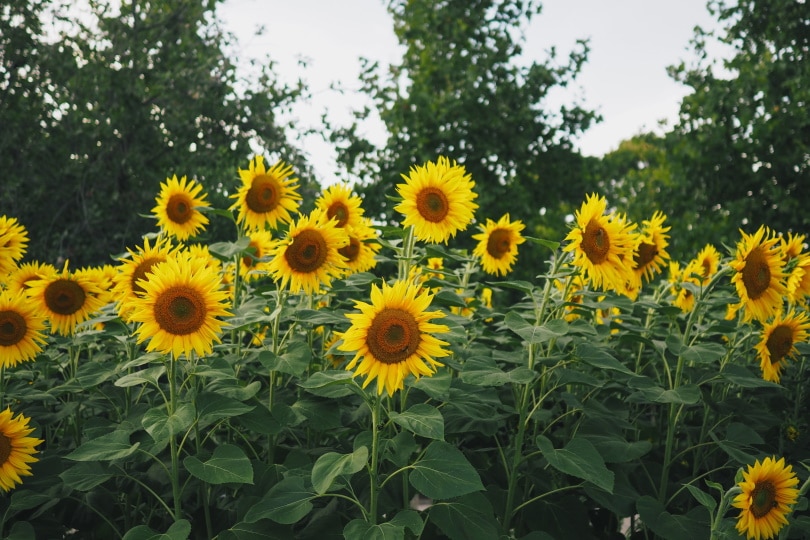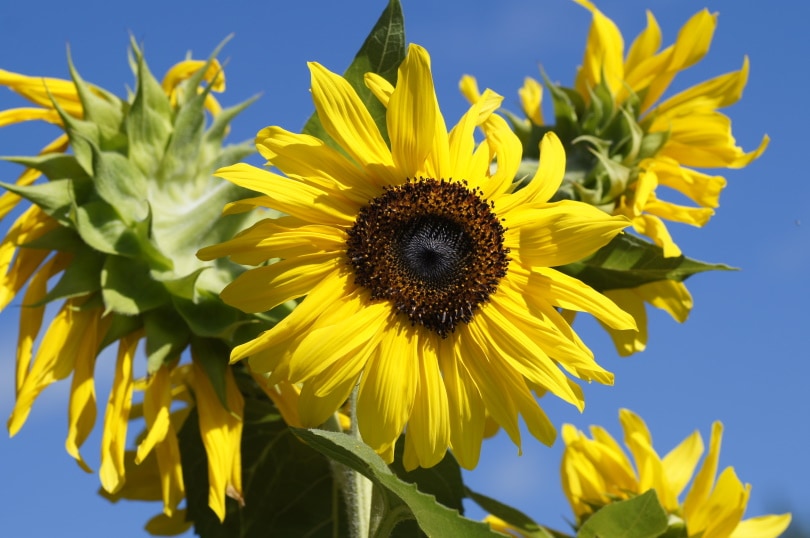Are Sunflowers Weeds? Facts & FAQs
-
Pete Ortiz
- Last updated:

Sunflowers are instantly recognizable plants, and they are very popular with people around North America. Many people consider sunflowers to be attractive blooms but there are some people who consider sunflowers to be nuisance plants. Some even call sunflowers a weed. If you ask 100 different gardeners and farmers their opinions on sunflowers, you are likely to get a large variety of answers. With so much confusion surrounding the sunflower, it is fair to wonder if they count as a weed or a flower. Are sunflowers weeds?
There are two main varieties of sunflower, the cultivated sunflower, and the wild sunflower. Many people consider the former to be a legitimate plant while most people consider the latter to be a weed. But determining whether or not a sunflower is a weed depends on how they are planted and on the person observing the flowers.
Sunflowers can be considered legitimate flowers or weeds. Here is how.
Sunflowers As a Flower
There is a species of cultivated sunflower that is extremely popular across the United States – the common sunflower. Common sunflowers are popular for their size, height, large yellow bloom, and their seeds. They make great barrier plants. They can also be used in floral arrangements and attract honeybees and other pollinators. The common sunflower is the state flower of Kansas. Many home improvement stores sell sunflower seeds so you can plant your own flowers in your garden, flower box, or near the road.
For all of these reasons, sunflowers are very popular blooms. Any sunflowers cultivated on purpose, for any purpose, are not considered to be a weed.
That being said, despite all of the numerous benefits and roles that sunflowers can take on they are not always looked at in a favorable light. It is hard for some people to imagine the sunny disposition of a sunflower being seen as a weed but there is a variety of sunflower that is unwelcome in many places.

Sunflowers As a Weed
Wild sunflowers are often considered to be weeds. Wild sunflowers spread quickly, and have an ugly gangly appearance before they bloom, they grow fast, and they produce dozens of small blooms rather than a single large bloom. A single wild sunflower plant can easily spread into six, ten, or twenty plants in a single season. Entire fields can be taken over and dominated by this fast-growing plant. Any sunflowers that pop up in this way, against your wishes, can be considered a weed.
Wild sunflowers are often despised more than their cultivated cousins because of their appearance and how easily they can spread. One curious wild sunflower growth can quickly spread and take over a yard. If you are not someone who wants dozens of haphazardly placed sunflowers on your lawn you are going to have to cut them down like any other weed.
Farmers and professional gardeners are more likely to consider a sunflower a weed than regular homeowners. Farmers consider any unwanted plant that can disrupt their crops or harm the quality of their soil a weed. Similarly, professional gardeners are more likely to look poorly on an unwanted plant, especially one that spreads quickly, than a typical gardener.

Weeds Are What You Make Them
Technically, weeds can be any type of plant. A weed is simply a plant that is growing where you do not want it to. The government classifies some types of plants as weeds for their own control purposes but for the typical gardener, any plant that is undesirable is a weed. That means that if it shows up in your garden and you did not plant it, it is a weed. Wild sunflowers are therefore considered to be weeds in most cases because they appear on their own and spread on their own.
However, some people find wild sunflowers beautiful. If wild sunflowers appear and you like how they look or if they are not bothering anyone or anything then you can view them as a happy accident rather than a weed. The bottom line is if you like sunflowers they are likely not going to be viewed as a weed. If you don’t like sunflowers, they will likely be seen as a weed if and when they show up in your yard.
That goes for any plant. Prized orchids or flowering hydrangeas can be considered weeds if they appear in your garden when you do not want them there. Appearance, function, and species have nothing to do with a plant’s status as a garden weed.
Conclusion
In the case of the sunflower, beauty is truly in the eye of the beholder. The stem of the sunflower is green, hairy, and hollow — like a weed. However, they produce beautiful yellow blooms that many people adore. If you plant sunflowers, they are not considered weeds but if they start cropping up all over your property like dandelions they are often considered to be nuisances. After all, what is the difference between a wild sunflower and a dandelion other than size? It turns out, not much.
Featured Image Credit: Piqsels
Contents


